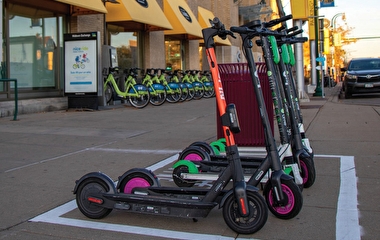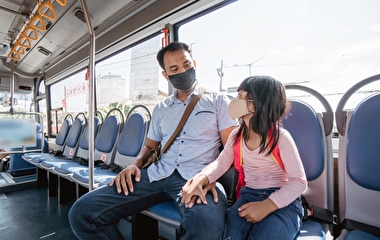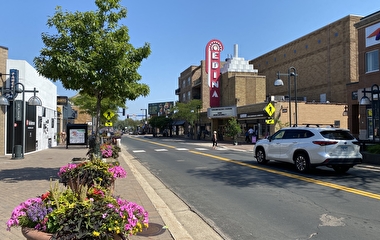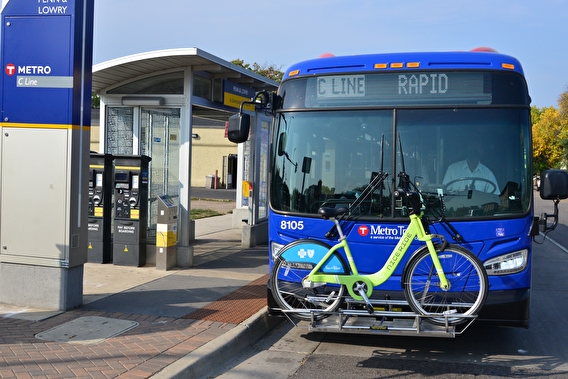
Shared-mobility services have continued to provide essential transportation during the COVID-19 pandemic, and providers have introduced innovative service models to meet the needs the pandemic created. Still, the pandemic has influenced attitudes toward shared mobility and disrupted typical commute patterns for many Minnesotans, and both public and private providers have experienced large declines in ridership and revenue.
The Twin Cities Shared Mobility Collaborative (TCSMC), which includes transportation leaders, public agencies, private companies, city officials, and nonprofit organizations, turned to the University of Minnesota for guidance in navigating the challenging course ahead.
In September, a research team led by Humphrey School professor Jerry Zhao, director of the Institute for Urban and Regional Infrastructure Finance, published Regional and Statewide Shared-Mobility Funding: Recommendations for Minnesota. The white paper, the first in a planned TCSMC series about shared-mobility issues, makes recommendations for increased public support of innovative shared-mobility projects based on opportunities identified through discussions with a TCSMC advisory panel.
“Public support has been important for funding innovative shared-mobility services that can fill gaps in existing transportation options,” says Zhao, the principal investigator. “That support is especially important given the uncertainty the pandemic has brought for shared mobility.”
A variety of shared-mobility services such as public transit, ride sharing, ride sourcing, bike sharing, and scooter sharing play an important role in Minnesota’s transportation network. Recent technology innovations, evolving attitudes, and government interest have led to the proliferation of shared-mobility services to fill important transportation gaps, such as transportation to work, health care, and other essential services. Shared-mobility services also offer other benefits, such as lower air pollution and transportation costs.
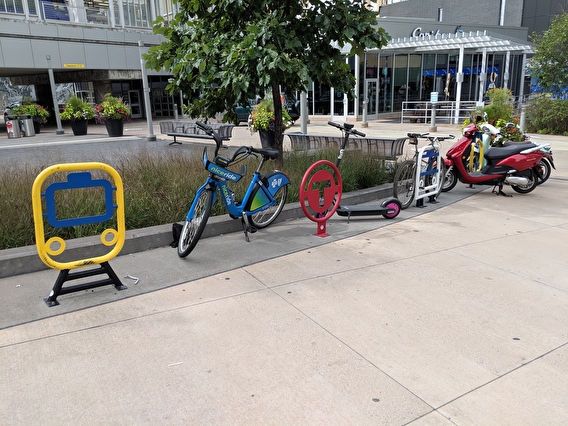
“Shared mobility is a key part of the future-focused transportation solution Minnesotans need to respond to the climate crisis,” says Mary Morse Marti, executive director of Move Minneapolis and TCSMC co-chair. “Innovation is happening all around us, and capital is typically the barrier to proof-of-concept.”
The research team developed two key recommendations intended to ensure consideration of shared mobility options in public transportation funding decisions. The first proposes ways to improve shared-mobility funding through the Transportation Advisory Board of the Metropolitan Council, which awards federal funding to local transportation projects on a biannual basis. “It is an important source of transportation funding for the Twin Cities region and has provided previous funding for shared mobility,” Zhao says.
The recommendation, based on a national review of peer programs, focuses on encouraging innovation and increasing regional transportation equity, particularly through a special Met Council funding category for unique projects.
The second recommendation is for a $6–8 million competitive state grant program to fund innovative shared-mobility services that increase access to essential services in Minnesota. “The program would ensure that all areas of the state and the residents of those areas are prepared to take advantage of emerging technologies to make transportation more efficient and equitable,” Zhao says.
The framework for the proposed grant program was developed based on a review of shared-mobility funding programs in the United States. The suggested program shares many similarities with several innovative Federal Transit Administration programs and with the 2018 Michigan Mobility Challenge program.
“With relatively modest state and regional investments, we could seed entrepreneurial projects and build a transportation system that serves everyone: young and old, people at all income levels, people with disabilities, and certainly communities of color,” Morse Marti concludes. “These grant programs would be remarkably easy to implement by the Met Council, MnDOT, and other agencies and would result in big payoffs for Minnesota travelers.”
